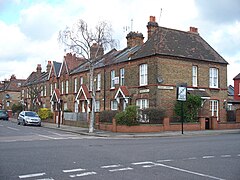| Noel Park | |
|---|---|
 Fourth-class houses in Darwin Road, built during the initial development of Noel Park in the 1880s | |
Location within Greater London | |
| Population | 5,670 [1] |
| OS grid reference | TQ315902 |
| • Charing Cross | 6.4 mi (10.3 km) SSW |
| London borough | |
| Ceremonial county | Greater London |
| Region | |
| Country | England |
| Sovereign state | United Kingdom |
| Post town | LONDON |
| Postcode district | N22 |
| Dialling code | 020 |
| Police | Metropolitan |
| Fire | London |
| Ambulance | London |
| UK Parliament | |
| London Assembly | |
Noel Park in north London is a planned community built in the late 19th and early 20th centuries consisting of 2,200 model dwellings, designed by Rowland Plumbe. It was developed as the Noel Park Estate on a tract of land on the edge of north London as part of the fast growing development of Wood Green. It is one of four developments on the outskirts of London built by the Artizans, Labourers & General Dwellings Company (Artizans Company). From 2003 to sometime in 2009, the name was also given to a small park near the southern edge of Noel Park, formerly known – and now known again – as Russell Park.
One of the earliest garden suburbs in the world, the Noel Park Estate was designed to provide affordable housing for working-class families wishing to leave the inner city; every property had both a front and back garden. It was planned from the outset as a self-contained community close enough to the rail network to allow its residents to commute to work. In line with the principles of the Artizans Company's founder, William Austin, no public houses were built within the estate, and there are still none today.
As a result of London's rapid expansion during the early 20th century, and particularly after the area was connected to the London Underground in 1932, Noel Park became completely surrounded by later developments. In 1965 it was incorporated into the newly created London Borough of Haringey, and in 1966 it was bought by the local authority and taken into public ownership.
Despite damage sustained during the Second World War and demolition work during the construction of Wood Green Shopping City in the 1970s, Noel Park today remains largely architecturally intact. In 1982, the majority of the area was granted Conservation Area and Article Four Direction status by the Secretary of State for the Environment, in recognition of its significance in the development of suburban and philanthropic housing and in the history of the modern housing estate.
